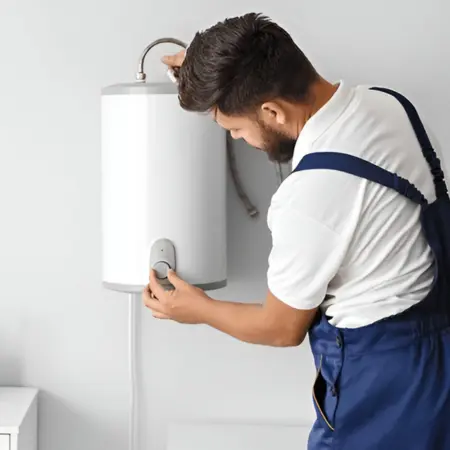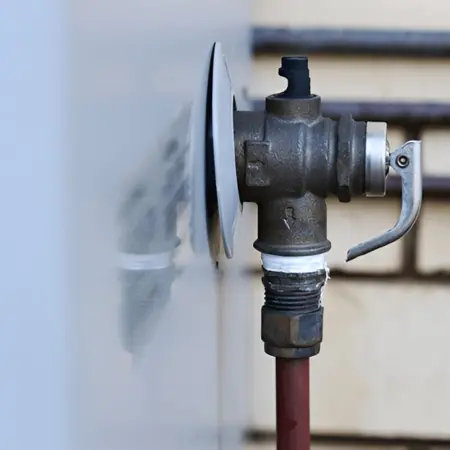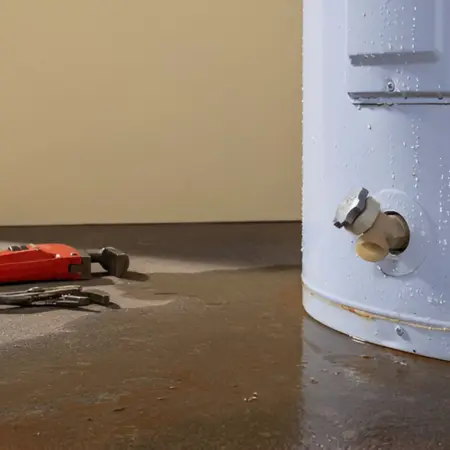Winter is here, and nobody wants to face a cold shower.
Proper water heater maintenance is key to keeping hot water flowing all season.
You can ensure your heater runs smoothly and stays reliable with a few simple tips.
Key Takeaways
- Setting the water heater too high can cause burns and raise energy bills.
- Proper insulation is key in winter to keep your water heater working well.
- Having a pro check your heater before winter can help prevent cold showers.
- Cover the heater with an insulating blanket and use foam covers for the pipes.
- For gas water heaters, proper ventilation is important.
- To change the thermostat, find the dial on the water heater and turn it to your preferred setting.
- The anode rod prevents rust and decay in the tank.
Winter Water Heater Maintenance Tips To Avoid Cold Showers
Don’t let cold showers ruin your winter.
Here are some easy maintenance tips to keep your water heater in shape.
Stay warm and cozy all season long.
1. Check The Temperature Setting
Setting your water heater to 120°F is important.
This temperature is hot enough for showers and washing but not too hot to cause burns.
If the setting is too high, it can lead to burning and increased energy costs.
You might get cold showers if it’s too low.
To adjust the thermostat, locate the dial on the water heater and turn it to the desired setting.

2. Inspect And Flush The Tank
Dirt buildup can be a big issue in winter.
It can reduce efficiency and even damage the heater.
To flush the tank, turn off the heater and let it cool.
Connect a pipe to the drain valve at the bottom, and let the water run out until it’s clear.
If you have hard water, this should be done at least once a year or more.
3. Test The Pressure Relief Valve
The pressure relief valve is important for safety.
It helps release excess pressure that can build up in the tank.
To test it, lift the lever on the valve and let some water out.
If water flows freely, the valve is working.
It’s time to replace it if it doesn’t work properly or if you see rust and leaks.
4. Check The Insulation (Covering)
Good insulation is essential during winter to keep your water heater efficient.
Check the insulation around the heater and the pipes.
If it feels thin and worn, consider adding extra insulation.
You can wrap the heater in an insulating blanket and use foam pipe covers for the pipes.

5. Inspect The Anode Rod
The anode rod helps prevent decaying and corrosion (rusting) in the tank.
Check it by removing it from the top of the heater.
If it’s heavily corroded and less than half an inch thick, it’s time to replace it.
A good anode rod can extend the life of your water heater.
6. Examine The Vents
For gas-powered water heaters, proper venting (air) is essential.
Blockages can cause dangerous fumes to back up.
Check the vent pipe for any blockages, like leaves and nests.
Regularly clear away debris to keep the venting system working well.
7. Look For Leaks Or Drips
Leaks can happen at connections, pipes, and the tank itself.
Check these areas regularly.
Leaks can lower water heater performance and lead to larger problems in winter.
If you find a leak, turn off the water supply and call a plumber for help.
Contact us at Leak Rpeair Services for expert help.

8. Schedule A Professional Inspection
It’s smart to call a professional plumber at least once a year.
They can spot missed issues and ensure your water heater runs safely and efficiently.
Getting an expert to check your heater before winter can help you avoid cold showers.
It can also save you from expensive repairs later on.
Contact us at OP Plumbing Hub for high-quality services.
Conclusion
This article is a guide on winter water heater maintenance.
Following these simple tips, you can keep your water heater running all winter.
Contact us at OP Plumbing Hub for expert help and enjoy hot showers, no matter how cold it gets outside.
